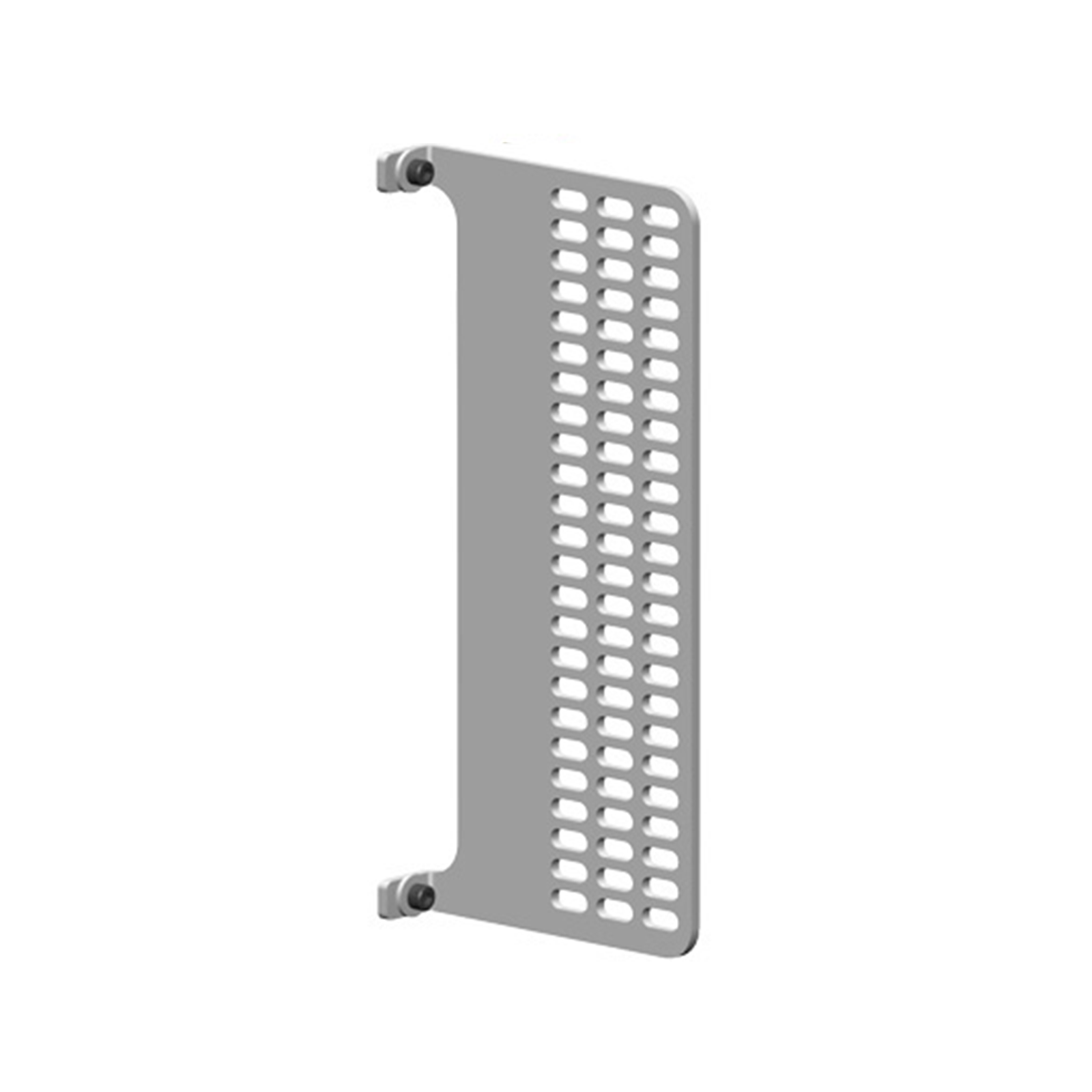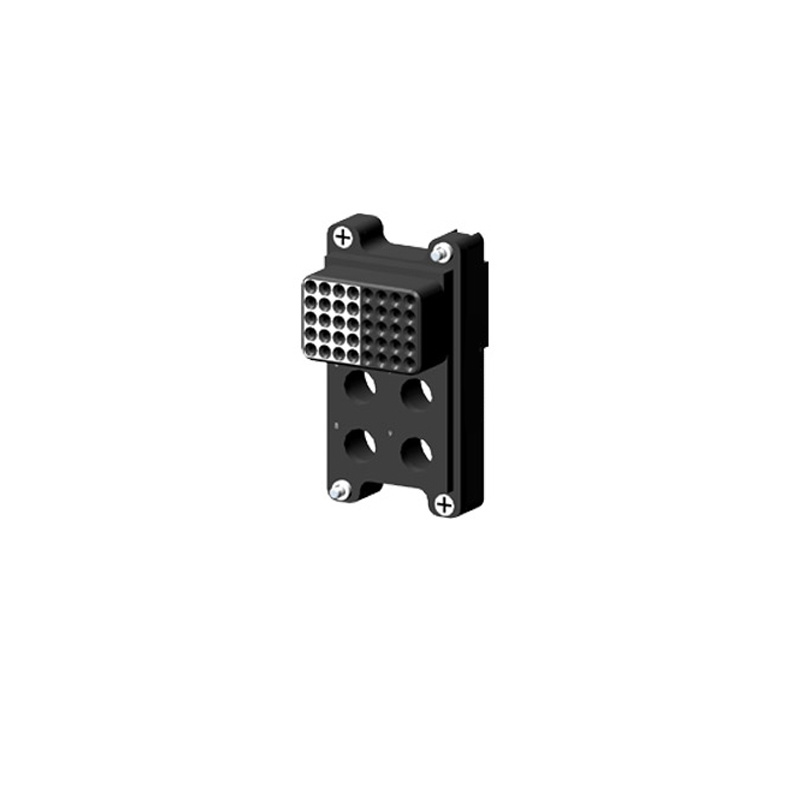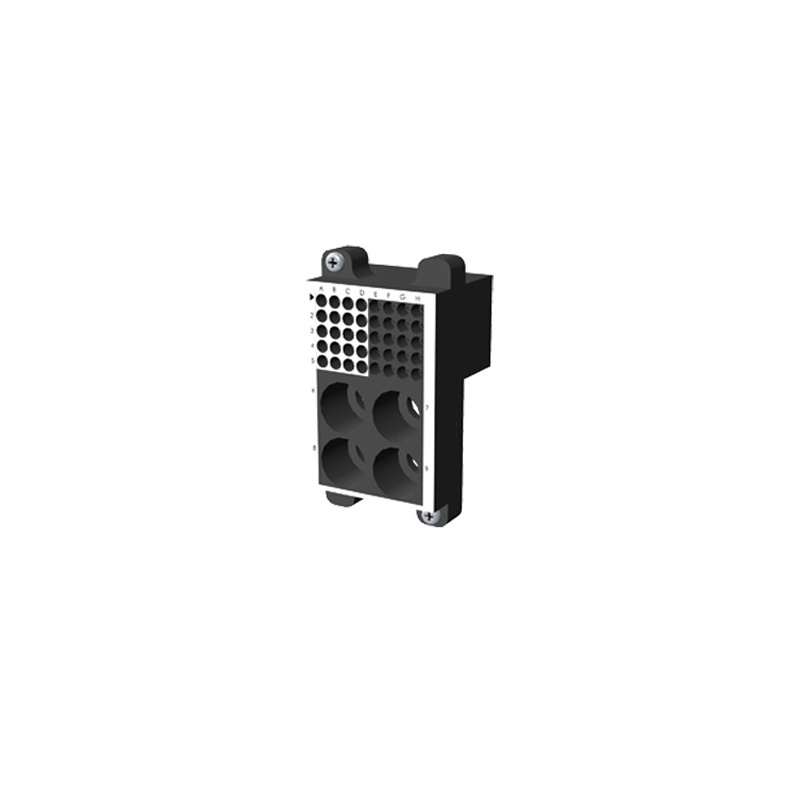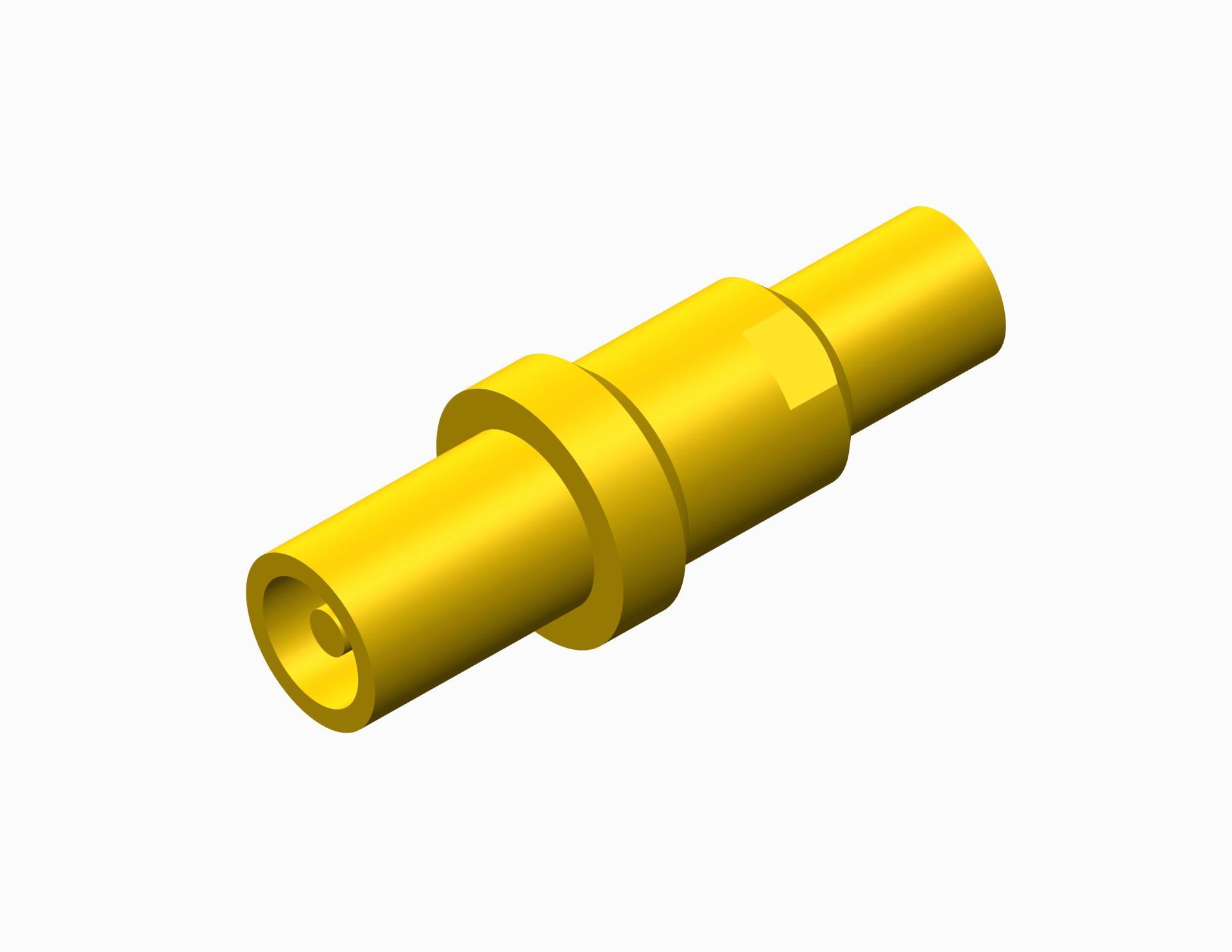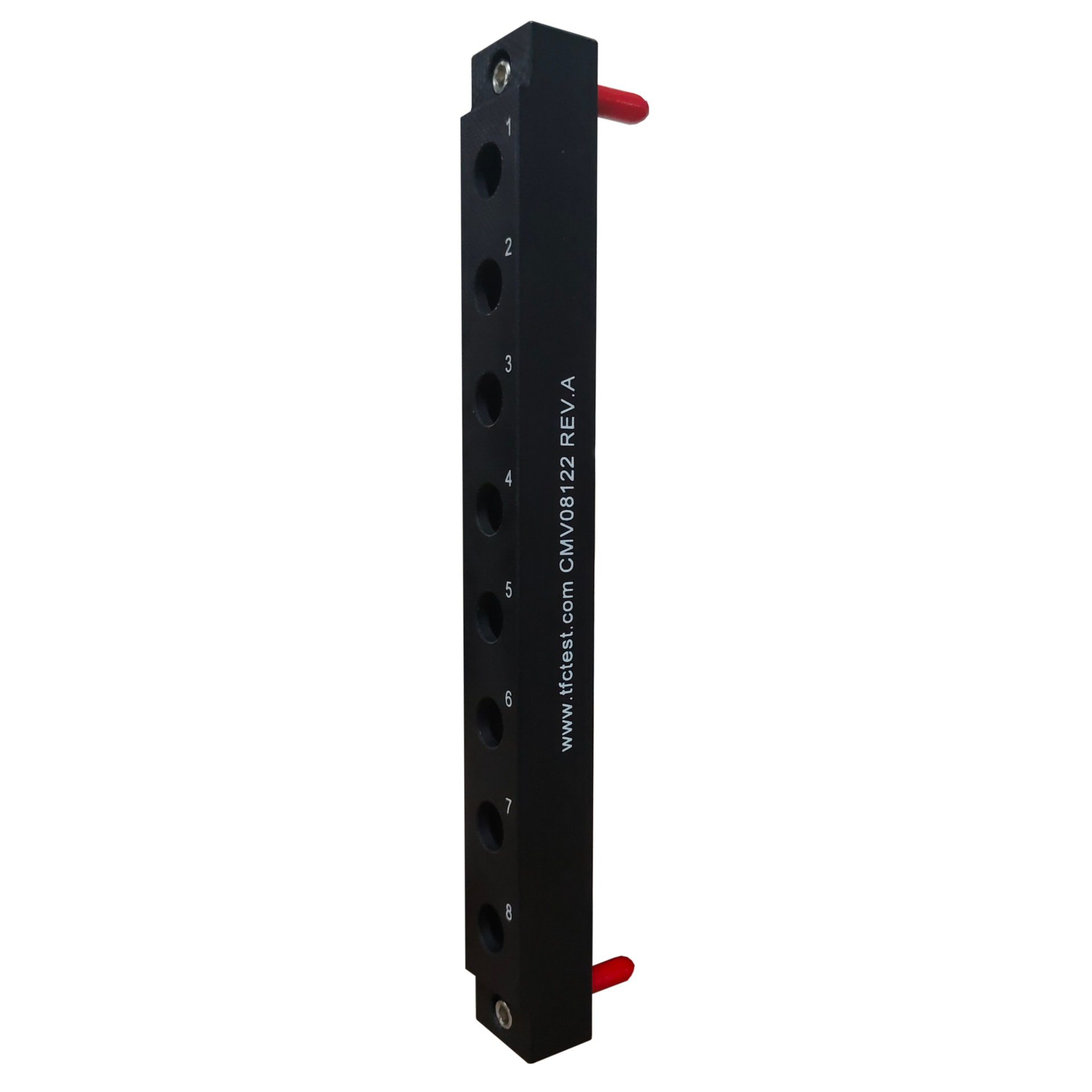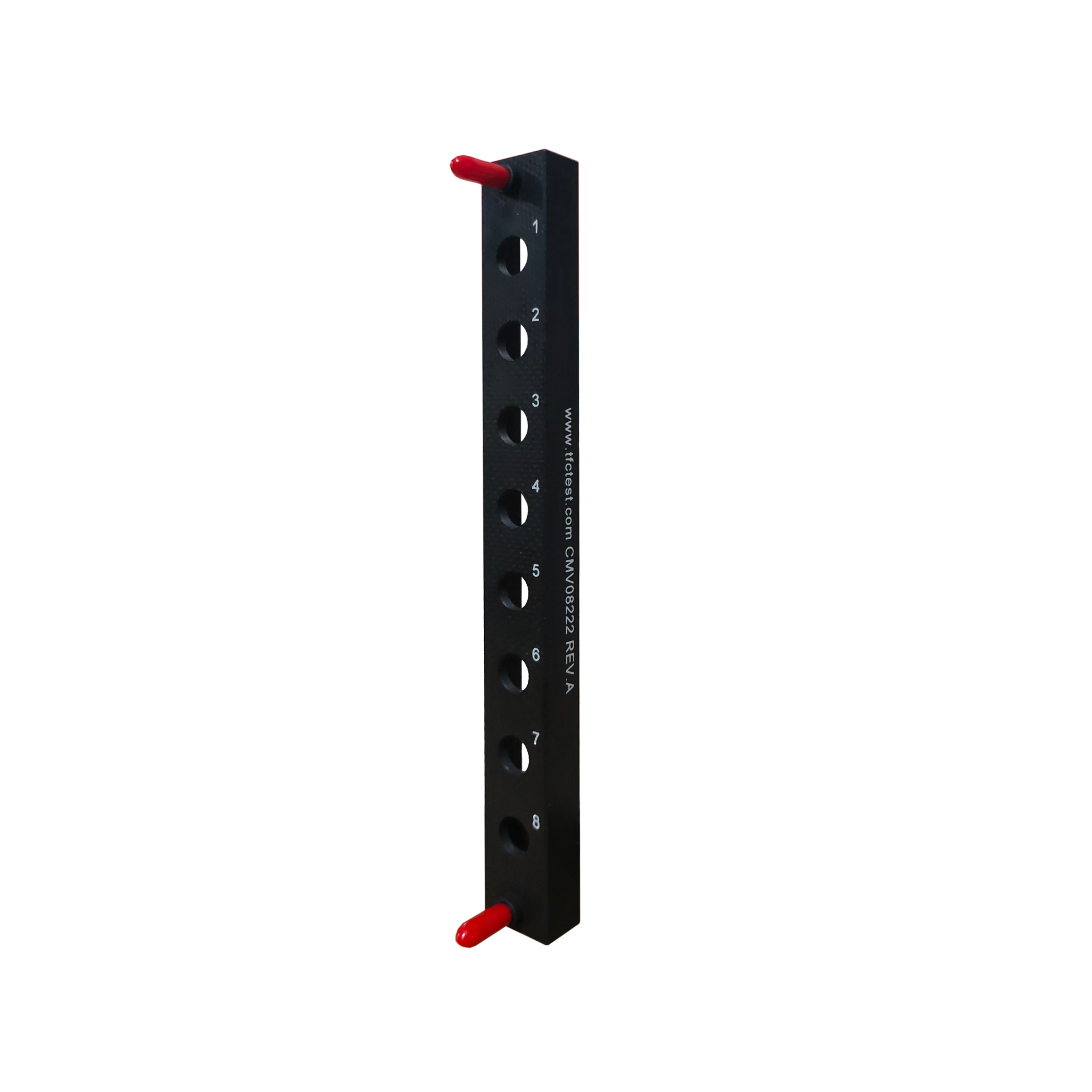
Dual Coaxial Series
It is primarily composed of an inner conductor, an insulating layer, an outer conductor, and the outermost jacket. The inner conductor is encased in a layer of insulating material, and this assembly is further surrounded by the outer conductor, which is also electrically isolated from the inner conductor via the same insulating layer. This unique structure gives the twin-coaxial cable excellent shielding performance and ensures stable signal transmission.
According to the corresponding pinhole, the number of modules to choose the appropriate frame
According to the type: power supply, signal, data, coaxial, optical fiber, pneumatic and fluid, etc.; According to the signal characteristics: voltage, current, power, frequency, pressure, rate, etc.; According to the cable connection mode: crimping, welding; According to the corresponding pinhole, there will be a corresponding module selection, and the number of signals to select the corresponding module.
According to the corresponding pinhole, the number of modules to choose the appropriate frame
According to the type: power supply, signal, data, coaxial, optical fiber, pneumatic and fluid, etc.; According to the signal characteristics: voltage, current, power, frequency, pressure, rate, etc.; According to the cable connection mode: crimping, welding; According to the corresponding pinhole, there will be a corresponding module selection, and the number of signals to select the corresponding module.
According to the selected pinhole module frame, select the appropriate supporting tools and accessories
Choose the appropriate frame based on the corresponding pinhole and the number of modules.
According to type: power, signal, data, coaxial, fiber optic, pneumatic, and fluid, etc.; according to signal characteristics: voltage, current, power, frequency, pressure, rate, etc.; according to cable connection methods: crimping, welding; then based on the corresponding pinholes, there will be corresponding module selections, as well as selecting corresponding modules based on the number of signals.
Select appropriate supporting tools and accessories based on the chosen pinhole module framework.
Select the appropriate frame based on the corresponding number of pinholes and modules.
According to type: power, signal, data, coaxial, optical fiber, pneumatic, and fluid, etc.; according to signal characteristics: voltage, current, power, frequency, pressure, rate, etc.; according to cable connection methods: crimping, welding; then, based on the corresponding pinholes, there will be corresponding module selections, as well as signal quantity selections corresponding to the modules.
Select appropriate matching tools and accessories based on the chosen pinhole module framework.
Choose the appropriate frame based on the corresponding pinhole and the number of modules.
According to type: power, signal, data, coaxial, optical fiber, pneumatic, and fluid, etc.; according to signal characteristics: voltage, current, power, frequency, pressure, rate, etc.; according to cable connection methods: crimping, welding; then based on the corresponding pinholes, there will be corresponding module selections, as well as selecting corresponding modules based on the number of signals.
Select appropriate supporting tools and accessories based on the chosen pinhole module framework.
Choose the appropriate frame based on the corresponding pinhole and the number of modules.
According to type: power, signal, data, coaxial, fiber optic, pneumatic, and fluid, etc.; according to signal characteristics: voltage, current, power, frequency, pressure, rate, etc.; according to cable connection methods: crimping, welding; then based on the corresponding pinholes, there will be corresponding module selections, as well as selecting the corresponding module based on the number of signals.
Select appropriate supporting tools and accessories based on the chosen pinhole module framework.
Choose the appropriate frame based on the corresponding pinhole and the number of modules.
According to type: power, signal, data, coaxial, fiber optic, pneumatic, and fluid, etc.; according to signal characteristics: voltage, current, power, frequency, pressure, rate, etc.; according to cable connection methods: crimping, welding; then based on the corresponding pinholes, there will be corresponding module selections, as well as selecting the corresponding module based on the number of signals.
Select appropriate supporting tools and accessories based on the chosen pinhole module framework.
CMV09002 ITA Stress Plate V VH Universal
CMV09004 Receiver Stress Plate V VH Universal
Choose the appropriate frame based on the corresponding pinhole and the number of modules.
According to type: power, signal, data, coaxial, fiber optic, pneumatic, and fluid, etc.; according to signal characteristics: voltage, current, power, frequency, pressure, rate, etc.; according to cable connection methods: crimping, welding; then based on the corresponding pinholes, there will be corresponding module selections, as well as selecting the corresponding module based on the number of signals.
Select the appropriate supporting tools and accessories based on the chosen pinhole module framework.
Choose the appropriate frame based on the corresponding pinhole and the number of modules.
According to type: power, signal, data, coaxial, fiber optic, pneumatic, and fluid, etc.; according to signal characteristics: voltage, current, power, frequency, pressure, rate, etc.; according to cable connection methods: crimping, welding; then based on the corresponding pinholes, there will be corresponding module selections, as well as selecting the corresponding module based on the number of signals.
Select appropriate supporting tools and accessories based on the chosen pinhole module framework.
Choose the appropriate frame based on the corresponding pinhole and the number of modules.
According to type: power, signal, data, coaxial, fiber optic, pneumatic, and fluid, etc.; according to signal characteristics: voltage, current, power, frequency, pressure, rate, etc.; according to cable connection methods: crimping, welding; then based on the corresponding pinholes, there will be corresponding module selections, as well as selecting corresponding modules based on the number of signals.
Select appropriate supporting tools and accessories based on the chosen pinhole module framework.
Choose the appropriate frame based on the corresponding pinhole and the number of modules.
According to type: power, signal, data, coaxial, fiber optic, pneumatic, and fluid, etc.; according to signal characteristics: voltage, current, power, frequency, pressure, rate, etc.; according to cable connection methods: crimping, welding; then based on the corresponding pinholes, there will be corresponding module selections, as well as selecting the corresponding module based on the number of signals.
Select the appropriate supporting tools and accessories based on the chosen pinhole module framework.
CMV09002 ITA Stress Plate V VH Universal
CMV08311 mixed module, receiver, F series, 40TRI/4 dual coaxial
CMV08411 mixed module, ITA, F series, 40TRI/4 dual coaxial
CMV09002 ITA Stress Plate V VH Universal
CMV09004 Receiver Stress Plate V VH Universal
CMV09002 ITA Stress Plate V VH Universal
CMV09004 Receiver Stress Plate V VH Universal
CMV09002 ITA Stress Plate V VH Universal
CMV09004 Receiver Stress Plate V VH Universal
CMV09002 ITA Stress Plate V VH Universal
CMV09004 Receiver Stress Plate V VH Universal
CMV09002 ITA Stress Plate V VH Universal
CMV09004 Receiver Stress Plate V VH Universal
CMV09002 ITA Stress Plate V VH Universal
CMV09004 Receiver Stress Plate V VH Universal
CMV09002 ITA Stress Plate V VH Universal
CMV09004 Receiver Stress Plate V VH Universal
CMV01221 Signal Pin, ITA End, Dual Coaxial, 50 Ohm
CMV01121 Signal Socket, Receiver End, Dual Coaxial, 50 Ohm
CMV08311 mixed module, receiver, F series, 40TRI/4 dual coaxial
CMV08411 mixed module, ITA, F series, 40TRI/4 dual coaxial
CMV08122 Dual Coaxial Module, Receiver, 8 Channels
CMV08222 Dual Coaxial Module, ITA, 8 Channels
CMV09002 ITA Stress Plate V VH Universal
CMV09004 Receiver Stress Plate V VH Universal
CMV09002 ITA Stress Plate V VH Universal
CMV09004 Receiver Stress Plate V VH Universal
CMV09002 ITA Stress Plate V VH Universal
CMV09004 Receiver Stress Plate V VH Universal


